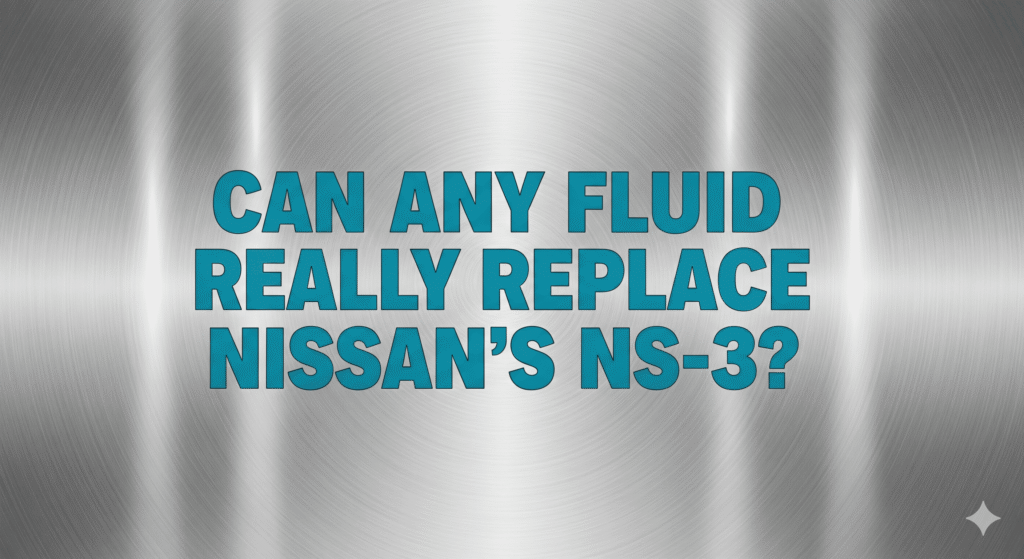Nissan’s Continuously Variable Transmissions (CVTs) have gained a strong reputation for their efficiency and smooth operation. However, these transmissions require a very specific type of fluid to maintain performance, namely the Nissan CVT Fluid NS-3.
If you’re a Nissan owner looking for a cost-effective and reliable alternative, it’s essential to choose the right product to protect your vehicle. Below, you’ll find everything you need to know about CVT fluid, the role of NS-3 fluid, and the best alternatives available.
What is CVT Fluid and Why NS-3 Matters
Overview of Continuously Variable Transmissions: Unlike traditional automatic transmissions with fixed gears, a CVT operates on a system of pulleys connected by a belt or chain. This allows the transmission to provide an infinite range of gear ratios, optimizing fuel economy and performance. Because of the unique design, CVTs require specialized fluid to reduce friction, prevent slippage, and ensure the transmission components work seamlessly.
Understanding the NS-3 Specification: Nissan NS-3 is not a marketing label — it is a defined fluid specification created by Nissan for its third-generation continuously variable transmissions (CVTs.) NS-3 was developed to replace the earlier NS-1 and NS-2 formulations, with a narrower viscosity profile and friction chemistry tailored to the high-ratio belt-and-pulley systems introduced after 2010.
Key Characteristics of NS-3:
Viscosity profile: NS-3 is designed as a low-viscosity CVT fluid, typically in the ~6.8–7.2 cSt at 100 °C range. This makes it thinner than earlier Nissan CVT fluids, which reduces drag and improves fuel economy while still maintaining adequate film strength.
Frictional balance: The fluid contains carefully balanced friction modifiers that prevent belt slippage under high load while allowing the smooth ratio changes that CVTs require. This balance is critical to both performance and long-term durability.
Thermal resistance: NS-3 is formulated to withstand oxidation and varnish formation even when sump temperatures exceed 100 °C in severe-duty operation. This stability helps preserve the fluid’s protective qualities over extended service intervals.
Additive chemistry: The package incorporates detergents, dispersants, phosphorus-based anti-wear agents, and anti-foaming components designed specifically for steel belt and pulley interfaces. The chemistry is distinct from conventional automatic transmission fluids, even if the appearance is similar.
Validation testing: Candidate fluids must pass Nissan’s internal CVT performance protocols, which are based on standards such as JASO M358 and ASTM D445 viscosity control. Only fluids that can hold the required friction curve, thermal resistance, and wear protection under these tests are recognized as meeting or exceeding NS-3 specifications.
In short, NS-3 is a low-viscosity, high-stability CVT fluid with a very specific friction and additive balance. Any alternative must explicitly state NS-3 compatibility because minor deviations in viscosity or friction curve can cause shudder, belt slip, or long-term wear.
Learn more about how CVT transmissions work and their benefits by clicking Here.
OEM Supplier Insight: Idemitsu and Eneos
Direct supply role: Two companies — Idemitsu and Eneos — are not just aftermarket brands. They are the original suppliers of CVT fluid to Nissan. When you buy a bottle of Idemitsu CVTF-NS3 or Eneos Eco CVT, you are essentially buying the same formulation Nissan bottles under its own label.
Why this matters: Many owners assume “OEM fluid” only comes in a Nissan container. In practice, Nissan sources directly from Idemitsu and Eneos, who also sell the identical chemistry through aftermarket channels.
Implication for alternatives: Because these are OEM suppliers, their aftermarket fluids usually match the color, viscosity, and friction profile of Nissan NS-3 exactly. That makes them a reliable choice for drivers who want full specification compliance without paying dealership pricing.
Neutral takeaway: Aftermarket fluids from Red Line, Valvoline, and AMSOIL offer valid NS-3 compatibility and performance advantages, but Idemitsu and Eneos represent a true OEM-equivalent option for those prioritizing exact match and dealer recognition.

Top Alternatives to Nissan CVT Fluid NS-3
Red Line Non-Slip CVT Fluid: Red Line Non-Slip CVT Fluid is a popular aftermarket choice for CVTs. Known for its high-quality base oils and carefully formulated additives, this fluid provides enhanced friction stability, thermal resistance, and wear protection. Users often highlight improved performance and cost-effectiveness when compared to Nissan NS-3 fluid. However, always double-check compatibility with your specific Nissan model.
Valvoline Full Synthetic CVT Fluid: Valvoline’s Full Synthetic CVT Fluid is another highly recommended alternative. With its advanced synthetic base, this fluid offers exceptional friction performance, affordable pricing, and wide compatibility with many CVT systems, including those requiring NS-3 specifications. Real-world users have reported consistent performance and reliability, with many preferring it for its availability and ease of use.
AMSOIL Synthetic CVT Fluid: AMSOIL Synthetic CVT Fluid is a standout option for those seeking premium performance. This high-performance fluid offers outstanding metal friction stability, excellent heat tolerance, and durability that supports long service intervals. Many Nissan owners trust AMSOIL for its record of protecting CVT systems. It’s slightly higher in cost compared to other alternatives but delivers uncompromising quality.
Comparison Table: Nissan CVT NS-3 Fluid Options
| Fluid | Notes |
| AMSOIL Synthetic CVT Fluid | Meets and exceeds Nissan NS-3 specification; engineered for wear protection, thermal stability, and smooth belt operation. |
| Idemitsu CVTF-NS3 | Meets Nissan NS-3 specification; OEM supplier chemistry. |
| Eneos Eco CVT Fluid | Meets Nissan NS-3 specification; identical to Nissan’s original fill. |
| Red Line Non-Slip CVT | High-performance synthetic; formulated for reduced slip and strong thermal stability. |
| Valvoline Full Synthetic CVT | Widely available; explicitly states compatibility with Nissan NS-3. |
Fluid Color and the “Same Shade” Question
Many Nissan owners notice that genuine NS-3 fluid is blue-green in color, and some worry that alternatives must look the same to be valid. In reality, the dye used in CVT fluids is not a performance property — it is added by the blender for identification, not for lubrication, friction control, or thermal stability.
Why it matters to users: Dealers and mechanics sometimes glance at fluid color as a quick check. An aftermarket fluid that looks very different (amber or clear) may raise questions, even if it meets the NS-3 specification. This explains why brands like Eneos Eco CVT and Idemitsu CVTF-NS3, both OEM suppliers, use a blue tint close to Nissan’s factory fill.
The technical reality: What matters is the viscosity, friction curve, and additive balance validated against NS-3 test protocols. Dye has no effect on wear protection, anti-slip performance, or service life.
Takeaway: Color can help avoid confusion at the service counter, but it is not a measure of compatibility or quality. Always rely on the specification claim (“meets or exceeds Nissan NS-3”) — not the shade in the bottle.
Performance Metrics
Frictional properties: All three aftermarket options excel in maintaining strong friction control. AMSOIL is particularly effective in preventing slippage.
Thermal stability: AMSOIL and Red Line perform exceptionally at high temperatures, while Valvoline offers decent thermal resistance for everyday use.
Anti-wear protection: AMSOIL is the top performer due to its advanced formulation, with Red Line and Valvoline also offering solid protection.
⚠️ NOTICE: Warranty & Oil Choice — Know Your Rights
Under the Magnuson-Moss Warranty Act, vehicle manufacturers cannot require you to buy their branded fluid to keep your warranty valid — unless they provide it free of charge. What matters legally is that the fluid meets the published specification for your transmission (in this case, Nissan CVT NS-3).
An OEM may recommend their branded fluid, but they cannot deny warranty coverage solely because you used another brand, as long as it meets NS-3 standards. This protection applies across all makes and models, not just Nissan.
For more details, see the Federal Trade Commission’s official page on the Magnuson-Moss Warranty Act.
Conclusion
Maintaining your Nissan’s CVT with the correct fluid is essential for smooth operation and long-term durability. While Nissan NS-3 fluid is the manufacturer’s recommendation, alternatives offer excellent performance at varying price points.
Ultimately, the best choice for you depends on your budget, driving conditions, and whether retaining warranty coverage is a priority. Always verify compatibility to make an informed decision that keeps your transmission running like new. For more details on high-performance motor oils, explore Red Line Here, Valvoline Here, and AMSOIL Synthetic CVT Fluid Here.
